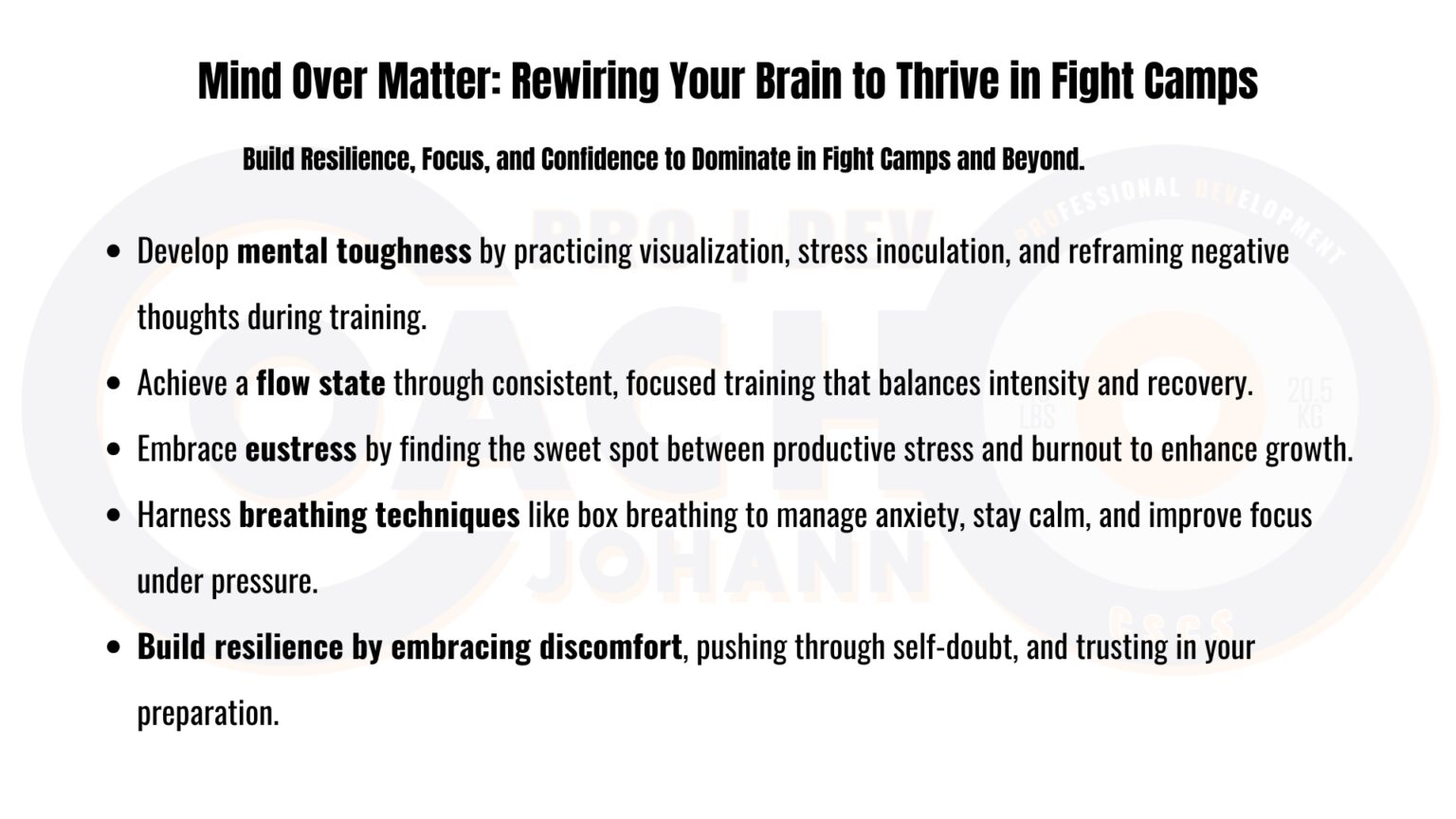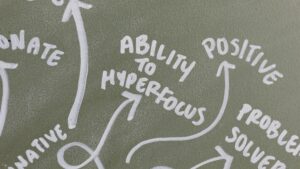
Mental toughness is the backbone of every successful fighter. The ability to perform under pressure, stay focused amidst distractions, and overcome obstacles is what separates the greats from the rest. However, mental toughness doesn’t come naturally for everyone. It’s built over time, through repetition, focus, and intentional training. In the context of fight camps, mental strength is just as crucial as physical conditioning. Without it, all the technique and muscle in the world won’t help when facing down an opponent.
This post will explore strategies fighters use to rewire their brains, strengthen their mental fortitude, and develop the resilience needed to succeed in high-pressure situations. Through mental rehearsal, stress inoculation, embracing discomfort, and managing anxiety, fighters can build a mindset that thrives under pressure. But just as mental toughness can be learned, it must be continually nurtured and practiced, especially during the grueling days of fight camp.
Additionally, we will dive into how fighters can enter a flow state during their training, where physical and mental performance peak. You’ll also learn about the concept of eustress, the sweet spot where stress becomes productive and leads to growth, rather than fatigue and burnout. Together, these mental strategies can help fighters perform at their highest level, both physically and mentally.

Mental resilience is the ability to recover from setbacks, adapt to challenges, and maintain focus under pressure. In a fight camp, mental resilience can be just as important as physical training. Fighters experience fatigue, fear, and self-doubt—but those who thrive are able to push through these emotions and come out stronger. The good news is that mental resilience can be developed, and it begins with understanding how your brain reacts to stress.
A core part of mental toughness training is stress inoculation. Just like you would expose your body to progressively heavier weights, you can train your mind by putting it under pressure in controlled situations. Sparring, high-intensity interval training (HIIT), and other tough workouts are all opportunities to test your mental limits. Over time, this builds the ability to stay calm, focused, and composed in high-stress situations—like a fight.
A key element of mental resilience for fighters is entering the flow state—a mental state where you are completely immersed in the task at hand, with no distractions, no self-doubt, and a sense of effortless control. Fighters who can achieve a flow state during training tend to have more consistent, high-level performances.

In the early stages of a fight camp, training can feel arduous. Your body is sore, your mind is cluttered with doubts, and the grind seems unrelenting. But over time, as you build consistency in your training routine, you begin to enter a state where everything clicks. This is when you experience supercompensation, a phase where your body adapts and improves in response to the stresses you’ve placed on it. You feel better, stronger, more skilled, and more confident in your abilities.
The process of achieving flow isn’t automatic—it takes time. In fact, getting to the flow state requires fighters to embrace discomfort. The more you train and expose your body and mind to stress, the better equipped you are to handle it. Eventually, you’ll find that your body can handle higher levels of training intensity without feeling overwhelmed. This is when you hit that sweet spot of physical and mental balance.
Stress is often seen as a negative force, but eustress is a term that refers to positive stress that motivates you to push harder and improve. Fighters must learn to embrace eustress in their training. Too little stress, and there is no progress. Too much stress, and burnout sets in. The key is to find that sweet spot where stress is motivating you to improve without pushing you into exhaustion.
Eustress is vital during fight camps. It’s the feeling of being “on edge” in a productive way. For example, the stress you feel before a tough sparring session or an intense training drill is eustress. It energizes you, sharpens your focus, and propels you to give your best effort. Eustress is the type of stress that helps fighters adapt to higher levels of intensity and continue to grow physically and mentally.
To manage eustress, fighters must monitor their physical and mental condition, adjusting training intensity and recovery periods as needed. By balancing high-intensity workouts with proper rest, fighters can avoid burnout while benefiting from the motivational aspects of eustress.
The brain is the powerhouse of mental toughness, with specific regions responsible for focus, stress management, and decision-making under pressure. Understanding how these areas function can help fighters leverage mental training for optimal performance.

The prefrontal cortex plays a vital role in decision-making, focus, and self-control. During fight camps, it helps fighters manage stress and make split-second decisions. Mental exercises like visualization and mindfulness strengthen this area, allowing fighters to stay composed under pressure.
The amygdala regulates emotions like fear and aggression. For fighters, an overactive amygdala can lead to anxiety or panic. Breathing techniques and stress inoculation help calm the amygdala, keeping fighters in control even during intense moments.
The brain’s ability to adapt, known as neuroplasticity, is key to building mental toughness. Repeated exposure to challenging situations, like sparring or high-pressure drills, rewires the brain to handle stress more effectively over time.
Breathing techniques are another powerful tool for controlling mental stress and anxiety during fight camps. Controlled breathing helps you stay calm under pressure, manage emotions, and clear your mind. Box breathing, diaphragmatic breathing, and other techniques allow you to control your body’s physiological response to stress. Fighters use breathing exercises before and after training sessions, and especially in the lead-up to a fight, to stay focused and prevent panic.
Breathing techniques are effective for:
By incorporating breathing exercises into your routine, you can train your mind to remain calm, even when faced with the intense pressures of a fight.

Strategy | Description | When to Use |
Visualization | Mental rehearsal of techniques and fight scenarios | Before training, during downtime, and before fights |
Stress Inoculation | Exposure to controlled stress to build resilience | During sparring, intense workouts, and high-pressure situations |
Breathing Techniques | Controlled breathing to reduce anxiety and stress | Pre-fight, during breaks in training, or before key moments |
Reframing Negative Thoughts | Transforming negative thoughts into empowering ones | Throughout training and during self-doubt moments |
Embrace Discomfort | Gradually increasing the intensity of training for adaptation | During sparring, heavy lifts, or high-intensity training |
Mental toughness allows fighters to stay calm, focused, and resilient in high-pressure situations. It’s vital for overcoming obstacles, managing fear, and maintaining peak performance during a fight.
Mental resilience is built through consistent mental training, including techniques like visualization, breathing exercises, and stress inoculation. These practices help fighters recover quickly from setbacks and stay focused during challenging moments.
The flow state is a mental state where fighters are fully immersed in the task at hand, with no distractions or self-doubt. Achieving flow allows fighters to perform at their best and feel a sense of effortless control during training and fights.
Eustress is positive stress that motivates fighters to push themselves further without leading to burnout. By embracing eustress, fighters can maintain high energy levels and continually improve their performance.
Yes, breathing techniques like box breathing and diaphragmatic breathing are effective for calming anxiety and increasing focus. Fighters use these techniques to stay grounded and prevent panic before and during fights.
Fighters develop mental toughness by consistently pushing through tough workouts, sparring, and stress exposure. By embracing discomfort and practicing mental resilience techniques, fighters build the mental strength required to succeed in the ring.
Mental toughness is often the deciding factor between fighters who merely survive and those who thrive under pressure. While physical strength and technique are fundamental to success in the ring, it’s the ability to control your mind, manage stress, and persevere through adversity that separates the champions from the rest. Developing a strong mental game isn’t just about fighting through pain—it’s about staying focused when everything is on the line and trusting in your training when doubt creeps in.
By applying techniques like visualization, stress inoculation, and breathing exercises, fighters can build the resilience necessary to perform under high-pressure conditions. Just as you train your muscles, you must also train your mind to handle the mental demands of combat sports. This mental conditioning process prepares you for the mental and physical challenges that come with training camps and fights.
The key to building mental toughness lies in consistently pushing yourself through uncomfortable situations. This means embracing the grind of training, learning to deal with setbacks, and developing the confidence to trust your instincts when it matters most. As you continue to work on your physical fitness, it’s essential to incorporate mental training as a core part of your preparation.
Ultimately, the mindset you cultivate will be your greatest asset when faced with the adversity of a fight. Whether it’s overcoming self-doubt, managing anxiety, or staying composed under pressure, developing your mental toughness will ensure you’re ready for whatever challenges come your way. Remember, true mental strength is built over time, with consistent effort and dedication. The more you challenge your mind, the more resilient you’ll become.
By integrating these mental resilience strategies into your routine, you’ll not only improve your fight performance but also build the kind of unshakable confidence that can be applied to every aspect of life. When you train your mind to thrive under pressure, there’s no limit to what you can achieve.
coachjohanncscs.com only uses primary research and scholarly studies as references over secondary sites. Other references are primarily from reputable social media accounts of experts only in the fields of health, nutrition, sports science, physiology, psychology, and physical therapy.